Aquarium Conservation Efforts
Loveland Living Planet Aquarium (LLPA) believes in building a world in which everyone takes an active part in protecting Earth’s diverse ecosystems. Because all life is interconnected, we believe that we can make choices that will build a sustainable world for nature and humankind alike. Education and conservation actions are key components in building a community of environmental stewards.
All that we do at the Aquarium – caring for animals, teaching the public, visiting schools, and building partnerships – is part of our strategy to build and support healthy ecosystems around our Living Planet.
There are many ways you can support and join our conservation efforts. Please read on to learn more, or click below to get involved.
Species Survival Plan Programs
LLPA collaborates with zoos and aquariums around the country to ensure the survival of threatened and endangered animals as part of several Species Survival Plan® (SSP) Programs as administered by the Association of Zoos & Aquariums (AZA). SSPs are conservation and cooperative breeding programs that help maintain genetic diversity and stabilize the population of specific species. The Aquarium is home to several SSP programs for a variety of animals from around the globe.
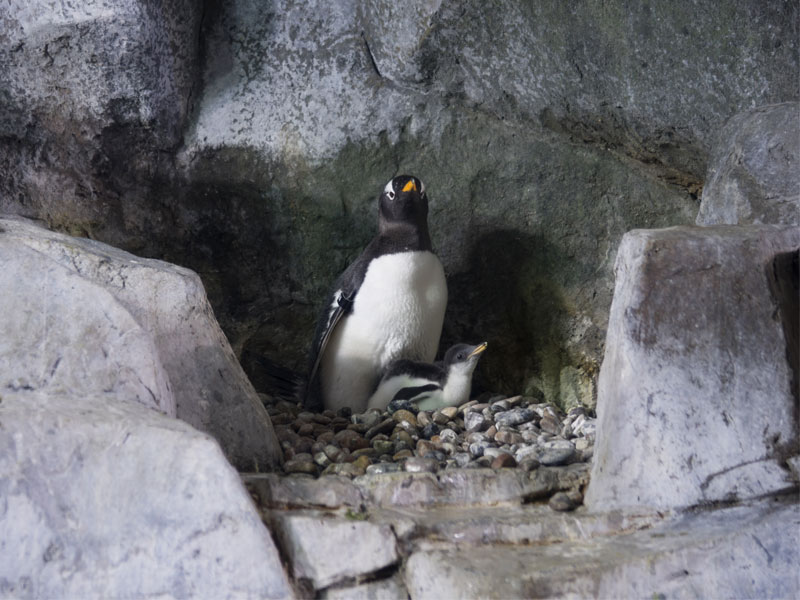
SSP Spotlight: Gentoo Penguins
The Aquarium is home to 21 Gentoo penguins, the third largest penguin species. The original 11 penguins came to us in 2010 from Moody Gardens in Texas. We’ve had four successful years of penguin births at LLPA.
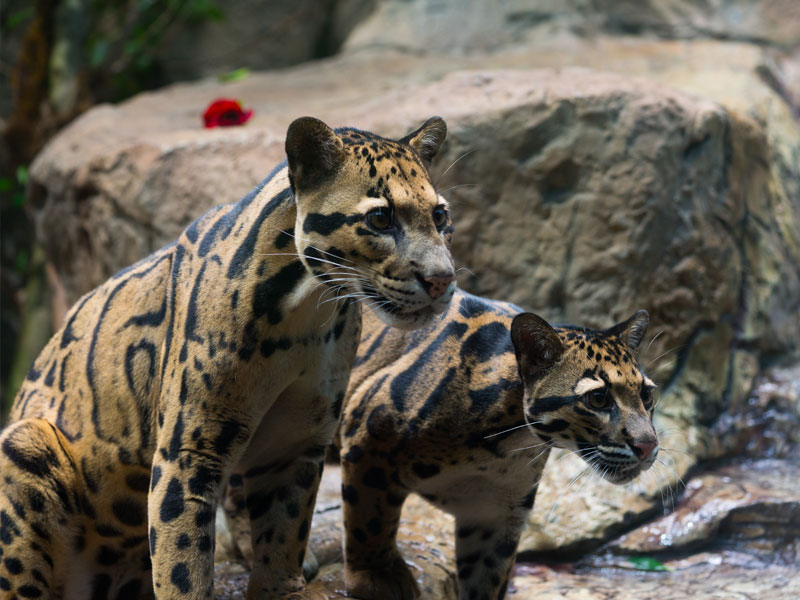
SSP Spotlight: Clouded Leopards
One of 23 institutions participating in the SSP for Clouded leopards, the Aquarium has two Clouded leopards, a male named Koshi and a female named Rhu. They came to us from the Houston Zoo and Denver Zoo in 2016.
Meet our other SSP Animals
Asian small-clawed otter
Big Bellied Seahorse
Binturong
Black-breasted Leaf Turtle
Blacktip Reef Shark
Blue-grey Tanager
Burmese Black Tortoise
Caiman Lizard
Crested Wood Partridge
Curl-crested Aracari
Grey-capped Emerald Dove
Keel-billed Toucan
Lesser Madagascar Tenrec
Lined Seahorse
Linneas’ two-toed sloth
Luzon bleeding heart dove
Nicobar pigeon
North American river otter
Prehensile-tailed porcupine
Southern Three-Banded Armadillo
White-blotched River Stingray
Yellow-rumped Cacique
North American River Otter Survey
In 2021, Aquarium staff and animal keepers joined the Division of Wildlife Resources (DWR) in an effort to survey river otter populations in Utah’s rivers and wetlands by tracking their location and monitoring behavior. Our team has set up trail cameras all over Utah river systems and collects video data on a regular basis. River otters are an essential indicator species for local ecosystems. The presence, absence, or abundance of indicator species, like otters, tells scientists if a system has resources enough to sustain wildlife. Your donation can help provide survey gear such as cameras, otter lure, GPS, waders, and batteries, travel across the state, and training for staff and volunteers.
Boreal Toad Project
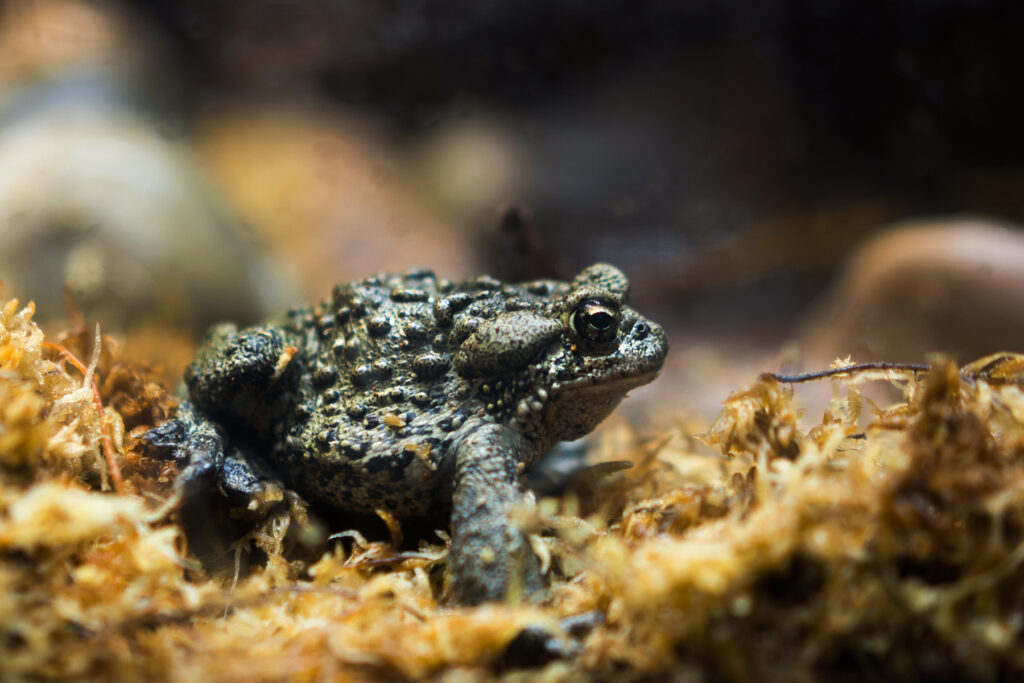
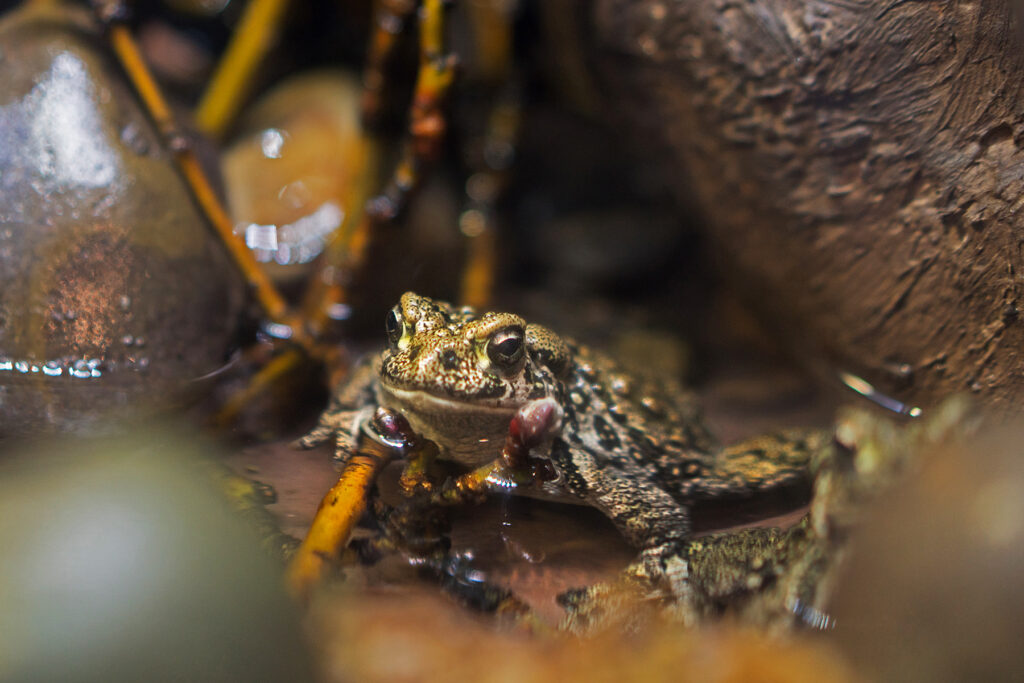
The Boreal toad is designated as a species of concern in Utah due to its limited range, combined with the arrival of chytrid fungus, which has been implicated in several population die-offs. Loveland Living Planet Aquarium works with Utah Division of Wildlife Resources (UDWR) Warmwater Fish Hatchery, Wild Utah Project, Wahweap Fish Hatchery, Utah’s Hogle Zoo, Denver Zoo, and Omaha’s Henry Doorly Zoo to perform regular surveys of Boreal toad populations throughout the state of Utah.
Based on partnership protocols, the Aquarium is working to retain a reserve population in case of extirpation (local extinction) of the species, as well as attempting captive breeding. If successful, the reared eggs will be returned to the UDWR for further propagation or release into the wild. The Aquarium is attempting to replicate natural hibernation parameters for some of our toads to help induce amplexus (breeding) come spring, with the hope of offspring. Our first attempt of breeding was in 2020 but no offspring. In 2021, we successfully raised seven toads to maturity and released them on the Paunsaugunt Plateau on July 8.
If you are interested in participating in Boreal toad surveys, please visit the Wild Utah Project website, or visit the conservation page at Utah’s Hogle Zoo.
Sustainable Food

The Monterey Bay Aquarium Seafood Watch® Program
This program helps consumers and businesses choose seafood that’s fished or farmed in ways that support a healthy ocean now, and for future generations. Their recommendations found on their website and The Seafood Watch App, indicate which seafood items are Best Choices or Good Alternatives, and which ones you should Avoid.
Fish are a primary food source for many animal species in the wild. The ocean is the great provider for ecosystems around the world. Like their cousins in the wild, many of the animals at LLPA rely on fish for their food. We support the efforts of Seafood Watch which makes recommendations to help you choose seafood that’s fished or farmed in ways that have less impact on the environment.
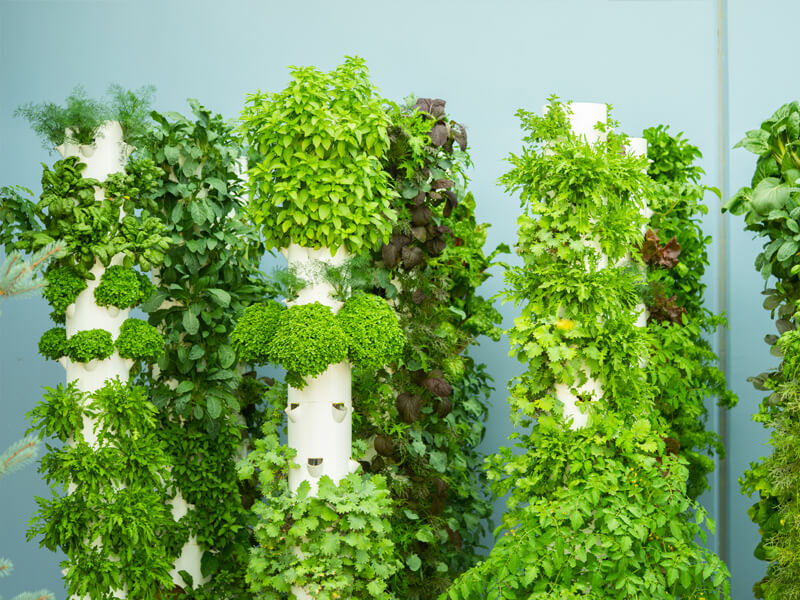
Vermilion Hospitality Group
We believe all food should be sourced in a sustainable manner and our catering partner, Vermilion Hospitality Group, upholds this standard in their daily operations. They source sustainable seafood, take steps to limit waste in the Living Planet Café and catering services, grow their own microgreens using aeroponic towers (growing plants without soil when weather allows), and utilize reusable or easily recyclable plating options whenever possible.
Reusable Energy & Water
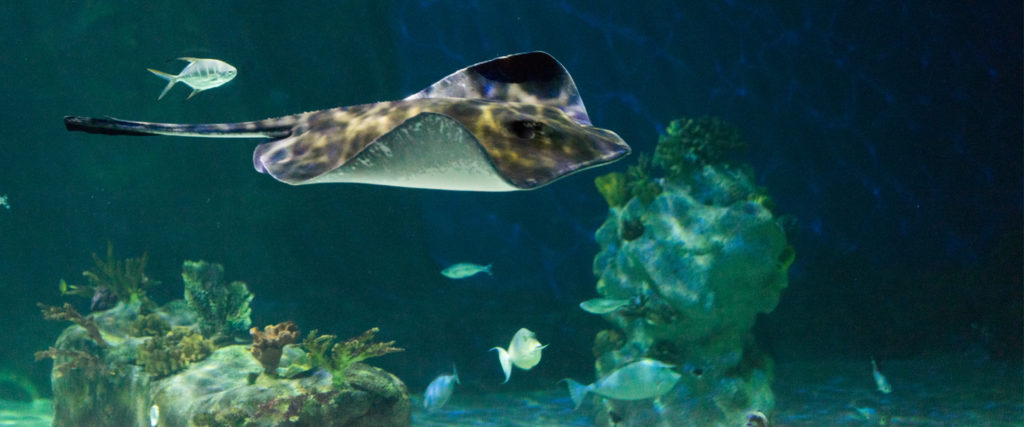
Water Filtration
As an Aquarium in a landlocked state – the second driest in the nation – water is an extremely precious resource. LLPA makes every effort to recycle and reuse as much water as possible while maintaining high water quality standards in our exhibits. To do this, every system has its own recirculating system. Additionally, water is reused and shared between exhibits, starting with the more sensitive invertebrates like Jellies, Sea stars, Coral, and Sea urchins, then on to a variety of fish and shark exhibits, and finally on to the Gentoo penguins.
When the Aquarium exchanges water between systems, there is a dedicated recovery system to filter and sterilize the water before it enters a new exhibit. This process allows the sustainable reuse of water while ensuring the lowest water and salt usage possible.
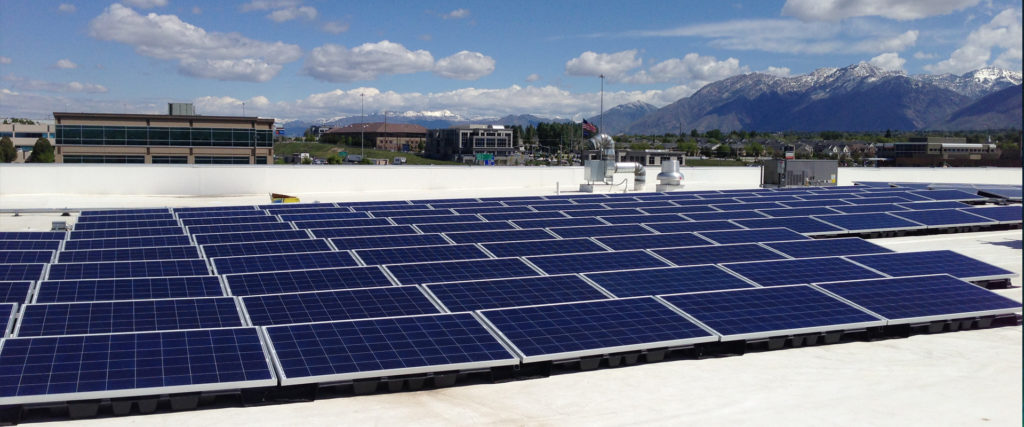
Solar Panels
The Aquarium installed solar panel arrays on the roof of our current facility to help offset electrical needs. As we expand, so will the number of solar panels and our ability to produce more solar energy for our operations.
Thanks to Rocky Mountain Power and their Blue Sky Program
Environmental Impact
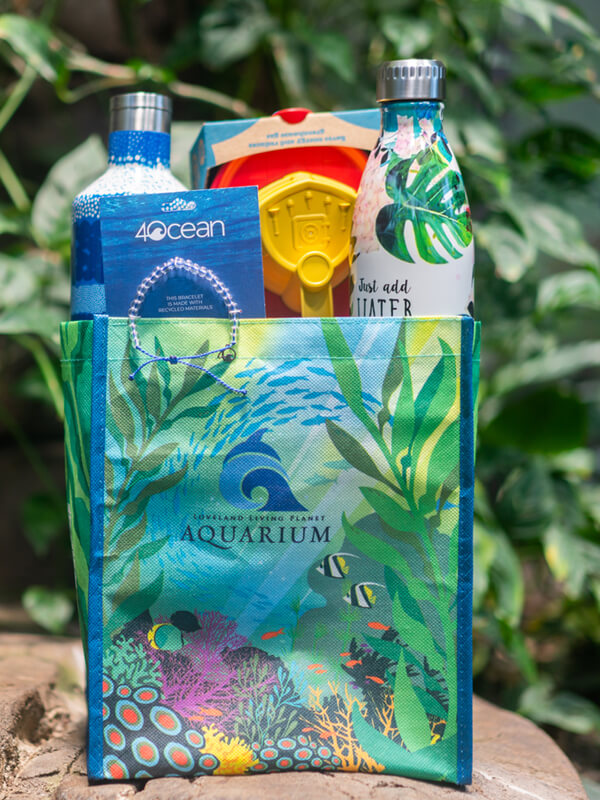
Event Network Gift Shop
Within our gift shop run by Event Network, we educate guests on the importance of keeping our oceans clean and plastic-free by providing a more sustainable and Earth-friendly shopping experience. From reusable water bottles (offered at a discounted price with any in-store purchase) to items made from upcycled or recycled goods, guests can choose from a wide variety of eco-friendly products that help promote a greener lifestyle.
We work closely with our vendors and suppliers to reduce the amount of single-use plastic used in the products, the packaging, and also in how it is shipped and delivered to the Aquarium. We do not use single-use plastic bags, which are one of the biggest polluters in our oceans, but instead, we offer reusable bags made from recycled plastic bottles at the register. Stop in to pick one up today and help preserve and protect our oceans.
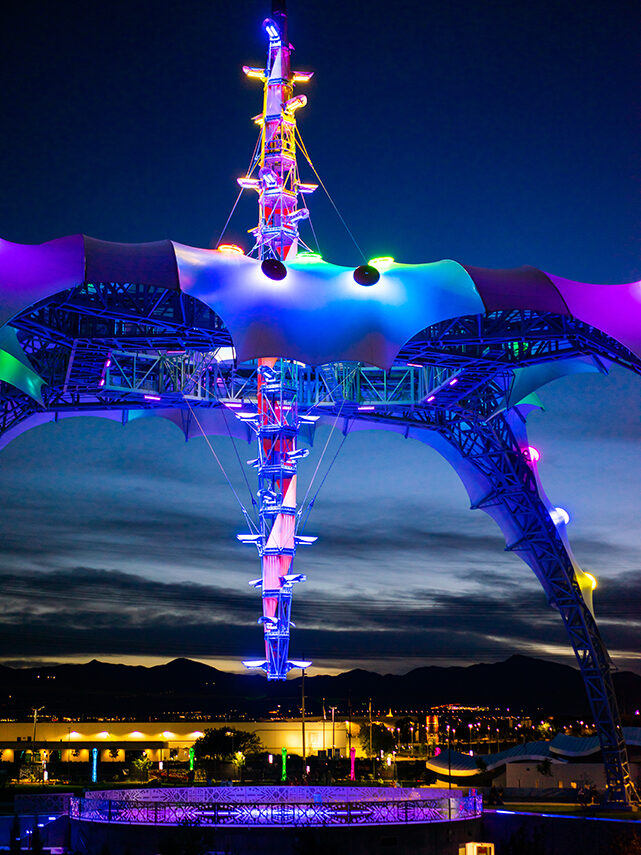
EECO
After traveling the globe as U2’s stage during the band’s record-breaking 360° Tour, EECO – Ecosystem Exploration Craft & Observatory (formerly known as The Claw) – crowns our Science Learning Campus and is sustainably repurposed as a permanent Utah landmark and majestic symbol of science exploration, learning, and conservation. By acquiring this stage, the Aquarium is recycling 200 tons of steel.
You can help promote the sustainable reuse of this iconic sculpture and create the Science Learning Campus by making a donation or buying a brick or plaque to be displayed in front of or on top of the stage beneath the famous structure.
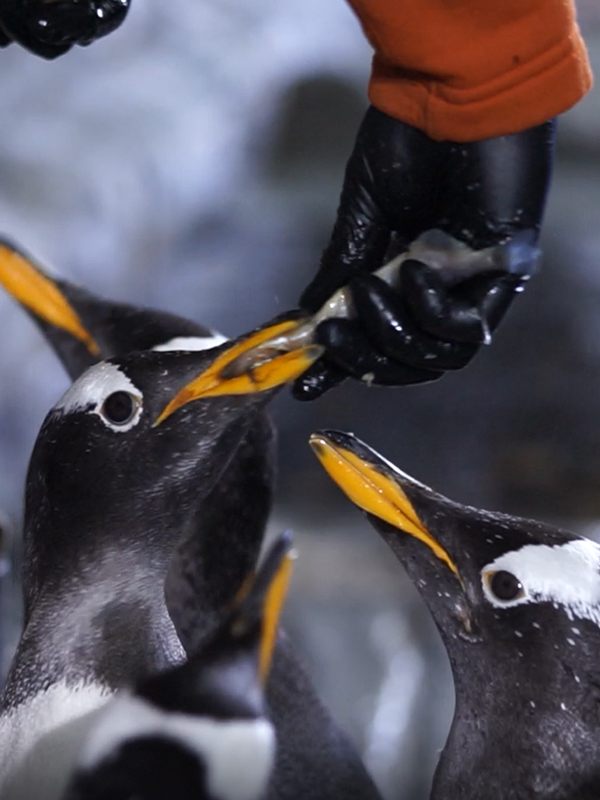
Recyclable Gloves
The Aquarium uses a lot of gloves every day for food preparation, animal habitat maintenance, and cleaning. We made the switch to recyclable gloves in 2018 by participating in the Kimberly-Clark “RightCycle” program. This change reduces the number of gloves sent to landfill by about 8.18 tons every year.
How it works
LLPA Team Members use the gloves, and then they’re collected on-site and shipped to a recycling center. The materials are integrated into new eco-friendly products such as flower pots and patio furniture.


